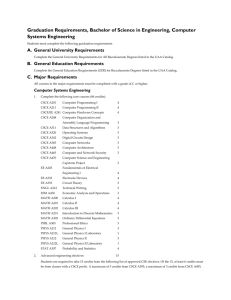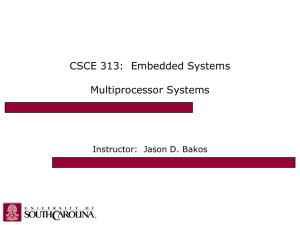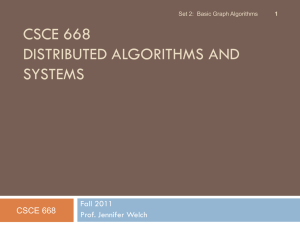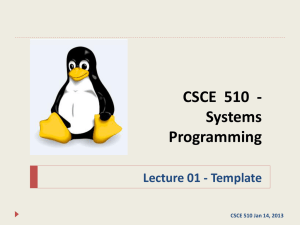Set 5a: Bellman-Ford
advertisement
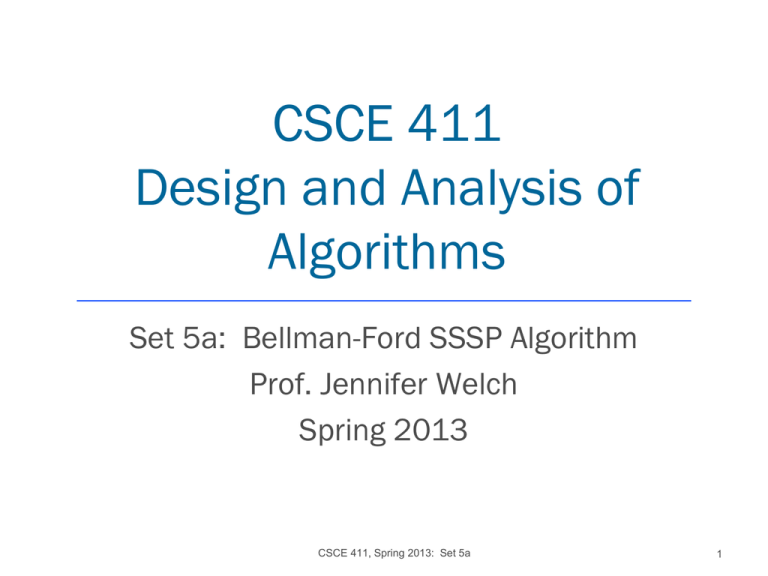
CSCE 411
Design and Analysis of
Algorithms
Set 5a: Bellman-Ford SSSP Algorithm
Prof. Jennifer Welch
Spring 2013
CSCE 411, Spring 2013: Set 5a
1
Bellman-Ford Idea
Consider each edge (u,v) and see if u offers v
a cheaper path from s
compare d[v] to d[u] + w(u,v)
Repeat this process |V| - 1 times to ensure
that accurate information propgates from s,
no matter what order the edges are
considered in
CSCE 411, Spring 2013: Set 5a
2
Bellman-Ford SSSP Algorithm
input: directed or undirected graph G = (V,E,w)
//initialization
initialize d[v] to infinity and parent[v] to nil for all v in V other than the
source
initialize d[s] to 0 and parent[s] to s
// main body
for i := 1 to |V| - 1 do
for each (u,v) in E do
// consider in arbitrary order
if d[u] + w(u,v) < d[v] then
d[v] := d[u] + w(u,v)
parent[v] := u
CSCE 411, Spring 2013: Set 5a
3
Bellman-Ford SSSP Algorithm
// check for negative weight cycles
for each (u,v) in E do
if d[u] + w(u,v) < d[v] then
output "negative weight cycle exists"
CSCE 411, Spring 2013: Set 5a
4
Running Time of Bellman-Ford
O(V) iterations of outer for loop
O(E) iterations of inner for loop
O(VE) time total
CSCE 411, Spring 2013: Set 5a
5
Bellman-Ford Example
a
3
s
2
b
—4
4
c
1
process edges in order
(c,b)
(a,b)
(c,a)
(s,a)
(s,c)
<board work>
CSCE 411, Spring 2013: Set 5a
6
Correctness of Bellman-Ford
Assume no negative-weight cycles.
Lemma: d[v] is never an underestimate of the actual
shortest path distance from s to v.
Lemma: If there is a shortest s-to-v path containing at
most i edges, then after iteration i of the outer for
loop, d[v] is at most the actual shortest path
distance from s to v.
Theorem: Bellman-Ford is correct.
Proof: Follows from these 2 lemmas and fact that
every shortest path has at most |V| - 1 edges.
CSCE 411, Spring 2013: Set 5a
7
Correctness of Bellman-Ford
Suppose there is a negative weight cycle.
Then the distance will decrease even after
iteration |V| - 1
shortest path distance is negative infinity
This is what the last part of the code checks
for.
CSCE 411, Spring 2013: Set 5a
8
Speeding Up Bellman-Ford
The previous example would have converged
faster if we had considered the edges in a
different order in the for loop
move outward from s
If the graph is a DAG (no cycles), we can fully
exploit this idea to speed up the running time
CSCE 411, Spring 2013: Set 5a
9
DAG Shortest Path Algorithm
input: directed graph G = (V,E,w) and source vertex
s in V
topologically sort G
d[v] := infinity for all v in V
d[s] := 0
for each u in V in topological sort order do
for each neighbor v of u do
d[v] := min{d[v],d[u] + w(u,v)}
CSCE 411, Spring 2013: Set 5a
10
DAG Shortest Path Algorithm
Running Time is O(V + E).
Example: <board work>
CSCE 411, Spring 2013: Set 5a
11


